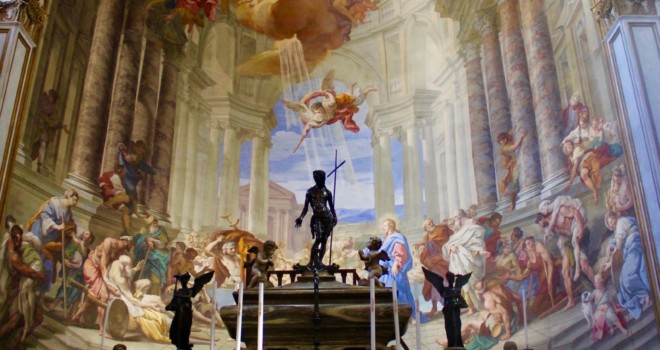What do we really need to live? No, not just survive, but to live a genuinely human life. Dostoyevsky, in his novel Demons, answers, even if he slightly exaggerates, in this way: “Man can live without science, he can live without bread, but without beauty he could no longer live, because there would no longer be anything to do to the world. The whole secret is here, the whole of history is here.” We might limp along, but could we really live without beauty? Without beauty, there would be no inspiration, no motivation to sacrifice for greater goods, no love.
Maybe that’s what’s wrong with the world, after all? It’s not that there’s no physical beauty. We all like to take walks in nature and we know the power of physical attraction. The problem is that for so many of us, beauty can stop there. It doesn’t lead us anywhere; it doesn’t inspire us to make a commitment. In the end, a mere surface beauty could remain vanity—an allurement that creates desire but doesn’t lead to love. Beauty should do more than provide a “delight to the eyes,” like the fruit that tempted Eve; it should push us outside of ourselves to lead us to what is true and good.
The experience of a deeper beauty is like falling in love. There is something that attracts our attention on the surface, but the more we know the person, the more we come to love who they are and even want to commit ourselves to their good. Physical attraction should lead to a spiritual attraction that lasts beyond any outward change. A married couple who have remained committed to each other for decades does not experience less love after the passing of their youthful looks. They find that through sacrifice, suffering, and a giving of self to the other that they are even more in love with the other’s beauty.
The goal of exterior beauty is to lead us to interior beauty. This is why God made the world beautiful, so that through it we could discover His own beauty. This is why God made man and woman to desire each of us so that their physical attraction could lead to spiritual communion. Therefore, the one who is Beauty itself, the Word of God, became flesh so that by gazing on His human face we could come to know divine beauty. God created beauty so that we would be inspired to love, would be inspired to give our lives away for what we love and so enter into a more sublime beauty.
Our culture is full of ugliness and vanity. We experience a never-ending bombardment of images and sounds that leave us in confusion and distraction. Media tempts us to a constant consumption, even of the beauty of the human body itself. In the midst of this confusion, we don’t have enough genuine beauty, something to inspire us to make a commitment to another and ultimately to God.
This is why beauty is so important for evangelization. When we discover true spiritual beauty, it makes us stop, it even wounds us (as Cardinal Ratzinger relates), and challenges us to become more fully human. Beauty tells us there is something more than what we see on the surface—there is something and someone worth knowing and loving. Christ ultimately reveals the beauty of human life to us, especially on the Cross. Life is beautiful—it’s a gift that we have received and one that we are meant to give to others.
In this sense, beauty really can save us, as Dostoyevsky relates in another novel, The Idiot: “Beauty will save the world.” An encounter with beauty will make us want to live differently, to sell all that we have to purchase the pearl of great price. Just like falling in love with our spouse, the beauty of Christ makes us fall in love with God, the one who can truly fulfill us. Understood in that way, beauty is more essential than science and even than ordinary bread. As human beings we live for beauty, for the beauty that will never fade, and which comes to us only from the saving power of Christ.
✠
Photo by Marie Rouilly on Unsplash













